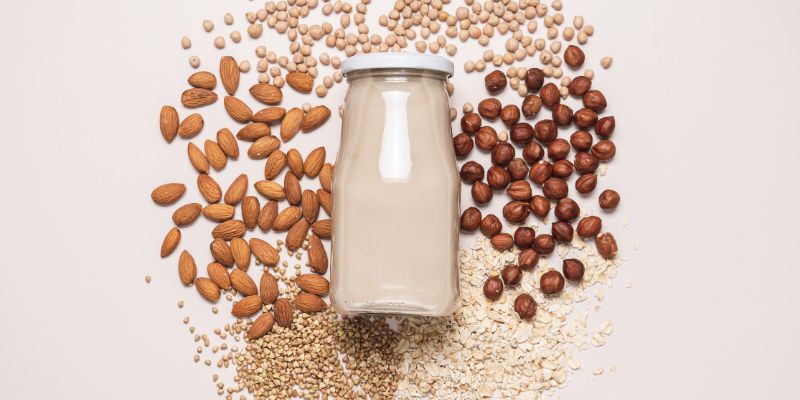An Ultimate Guide To Plant-Based Protein: Sources, Benefits, and More
Plant-based protein has become somewhat well-known recently, particularly among individuals trying a better lifestyle or switching to a vegan or vegetarian diet. Plant proteins have several advantages beyond merely encouraging muscle development and repair; they also enhance general health. Often absent in animal-based goods, these protein sources include fiber, vitamins, and minerals, together with vital elements.
This guide will assist you in investigating several plant-based protein sources if you're looking for a substitute for conventional animal proteins. From lentils to quinoa, knowing the range of plant protein sources can improve your nutrition and wellness.

What is Plant-Based Protein?
Plant-based proteins come from beans, grains, seeds, and vegetables, among other sources. Plant protein is naturally occurring and nutrient-dense, unlike animal protein, which usually comes from meat, eggs, and dairy. Essential macronutrient, it supports immune system activity, generates hormones and enzymes, and helps the body create and heal tissues.
Plant-based protein and animal protein differ primarily in their absence of cholesterol and lower levels of saturated fat in the former. For anyone worried about weight control and heart disease, plant-based protein is, therefore, a better option. Although the amino acid profile of plant-based proteins may differ, when taken in a varied diet, they offer all the necessary amino acids for the best health.
The Health Benefits of Plant-Based Protein
One finds a lot of health advantages from plant-based proteins. Above all, given their nutritious density, they are a great choice for enhancing general well-being. Here are several main benefits:
- Supports Muscle Growth and Repair: Although animal proteins are sometimes regarded as the gold standard for muscle development, plant proteins when mixed correctly, can also be quite successful.
- Reduces the Risk of Chronic Diseases: Research shows that plant-based diets lower the risk of ailments like hypertension, type 2 diabetes, and heart disease.
- Helps with Weight Management: Plant-based protein sources are often lower in calories and fat, supporting weight control and good body composition.
- Improves Digestion: High-fiber plant proteins nourish gut bacteria and encourage regular bowel movements, therefore supporting digestive health.
- Enhances Overall Nutrition: Plant sources provide a complete approach to health going beyond protein because they are high in vitamins, antioxidants, and good fats.
Top Plant Protein Sources for a Healthy Diet
Any diet can contain many plant-based protein items with simplicity. These are a few of the best sources:
- Legumes (Beans, Lentils, and Peas): Among the better sources of plant-based proteins are legumes. Strong in protein and fiber are lentils, chickpeas, black beans, and peas. Vegetarians and vegans would find a cup of lentils to be a great source of roughly 18g of protein. Among the several minerals and vitamins, they include iron, magnesium, and potassium.
- Tofu and Tempeh: Tofu and tempeh are basic sources of proteins in many plant-based diets. While tempeh is much more concentratedoffering over 30 grams per cup tofu has about 20 grams of protein per cup. From salads to stir-fries, both are rather flexible and fit for many kinds of cuisine.
- Nuts and Seeds: Wild seeds are high in good fats and have a somewhat large protein content. Great suppliers are almonds, walnuts, chia seeds and flaxseeds. For instance, whereas chia seeds offer roughly 5 grams per tablespoon, a cup of almonds has 8 grams of protein.
- Quinoa: Given that quinoa boasts all nine of the essential amino acids, it is sometimes referred to as a complete protein. A fantastic way to add variation to a plant-based diet, a cup of cooked quinoa has about 8 grams of protein. Along with other micronutrients, including magnesium and iron, it's also a rich supply of fiber.
- Whole Grains (Brown Rice, Oats, and Barley): Whole grains, including barley, oats, and brown rice, abound in excellent levels of protein. Although they might not provide as much protein per serving as soy products or legumes, they are nonetheless a vital component of a balanced diet. Their complex carbohydrates are also important for energy and metabolism.

How to Incorporate Plant-Based Protein Into Your Diet
Including plant-based proteins in your diet is simple and requires few major adjustments. The following are some guidelines:
- Add Legumes to Soups and Stews: Lentils, chickpeas, and beans are perfect complements for soups and stews. Toss them into creamy soups or stir them into thick vegetable stews for a protein boost.
- Replace Meat with Tofu or Tempeh: Stir-fries, tacos, or sandwiches call for tofu or tempeh as a meat replacement. Both can be marinated to improve taste.
- Snack on Nuts and Seeds: For a quick protein-packed snack, keep some almonds, sunflower seeds, or chia pudding on hand.
- Start Your Day with Plant-Based Protein: Stuff quinoa or oats into your morning dishes. Add nuts, almond butter, or protein powders derived from peas.
The Environmental Impact of Plant-Based Protein
The ecology can benefit greatly if one uses plant-based protein sources instead of animal-based ones. Among the main drivers of greenhouse gas emissions, deforestation, and water use are animal farming. Choosing plant protein helps you lower the carbon footprint related to food manufacture. For example, whereas making one pound of lentils consumes just 43 gallons of water, creating one pound of beef calls for around 1,800 gallons.
Changing to plant-based proteins also helps stop the typically negative effects of cattle rearing on soil deterioration. Furthermore, plant-based farming is usually more land-efficient, making it a viable option for an increasing world population.
Conclusion:
Plant-based proteins provide a multitude of health advantages, from enhancing muscular development to encouraging improved digestion. Meeting your protein needs is simple with so many varied sources, including beans, tofu, quinoa, and seeds. Selecting plant-based protein also helps you be ecologically friendly by lowering your carbon impact. Including plant-based proteins not only improves your health but also helps to create a more sustainable planet.












